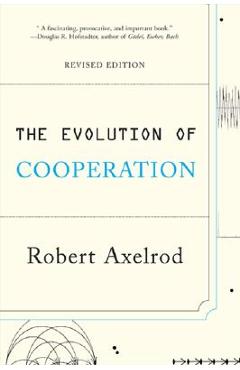The Evolution of Cooperation: Revised Edition - Robert Axelrod

Detalii The Evolution of Cooperation: Revised
libris.ro
150.11 Lei
166.79 Lei
Self-help
Robert Axelrod
The Evolution of Cooperation: Revised - Disponibil la libris.ro
Pe YEO găsești The Evolution of Cooperation: Revised de la Robert Axelrod, în categoria Self-help.
Indiferent de nevoile tale, The Evolution of Cooperation: Revised Edition - Robert Axelrod din categoria Self-help îți poate aduce un echilibru perfect între calitate și preț, cu avantaje practice și moderne.
Preț: 150.11 Lei
Caracteristicile produsului The Evolution of Cooperation: Revised
Comandă The Evolution of Cooperation: Revised Online, Simplu și Rapid
Prin intermediul platformei YEO, poți comanda The Evolution of Cooperation: Revised de la libris.ro rapid și în siguranță. Bucură-te de o experiență de cumpărături online optimizată și descoperă cele mai bune oferte actualizate constant.
Descriere magazin:
A famed political scientist\'s classic argument for a more cooperative world We assume that, in a world ruled by natural selection, selfishness pays. So why cooperate? In The Evolution of Cooperation, political scientist Robert Axelrod seeks to answer this question. In 1980, he organized the famed Computer Prisoners Dilemma Tournament, which sought to find the optimal strategy for survival in a particular game. Over and over, the simplest strategy, a cooperative program called Tit for Tat, shut out the competition. In other words, cooperation, not unfettered competition, turns out to be our best chance for survival. A vital book for leaders and decision makers, The Evolution of Cooperation reveals how cooperative principles help us think better about everything from military strategy, to political elections, to family dynamics. A famed political scientist\'s classic argument for a more cooperative world We assume that, in a world ruled by natural selection, selfishness pays. So why cooperate? In The Evolution of Cooperation, political scientist Robert Axelrod seeks to answer this question. In 1980, he organized the famed Computer Prisoners Dilemma Tournament, which sought to find the optimal strategy for survival in a particular game. Over and over, the simplest strategy, a cooperative program called Tit for Tat, shut out the competition. In other words, cooperation, not unfettered competition, turns out to be our best chance for survival. A vital book for leaders and decision makers, The Evolution of Cooperation reveals how cooperative principles help us think better about everything from military strategy, to political elections, to family dynamics. A famed political scientist\'s classic argument for a more cooperative world We assume that, in a world ruled by natural selection, selfishness pays. So why cooperate? In The Evolution of Cooperation, political scientist Robert Axelrod seeks to answer this question. In 1980, he organized the famed Computer Prisoners Dilemma Tournament, which sought to find the optimal strategy for survival in a particular game. Over and over, the simplest strategy, a cooperative program called Tit for Tat, shut out the competition. In other words, cooperation, not unfettered competition, turns out to be our best chance for survival. A vital book for leaders and decision makers, The Evolution of Cooperation reveals how cooperative principles help us think better about everything from military strategy, to p

Produse asemănătoare
Produse marca Robert Axelrod

The Evolution of Cooperation: Revised Edition - Robert Axelrod
![]() libris.ro
libris.ro
Actualizat in 05/06/2025
150.11 Lei

A Passion for Cooperation: Adventures of a Wide-Ranging Scientist - Robert Axelrod
![]() libris.ro
libris.ro
Actualizat in 25/10/2024
185.63 Lei
